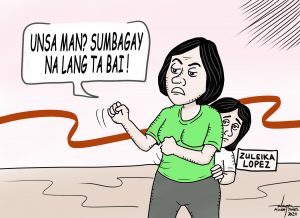 SHORTLY before the weekend, the people of Davao del Norte – or most of them – were shocked at the news that their long-desired change in their power distribution utility again failed.
SHORTLY before the weekend, the people of Davao del Norte – or most of them – were shocked at the news that their long-desired change in their power distribution utility again failed.
This, after President Ferdinand “Bongbong” Marcos Jr. vetoed the bill authorizing the expansion of the franchise area of Davao Light and Power co., Inc., an Aboitiz conglomerate unit.
While the vetoed bill and the Northern Davao residents’ desire to have their power distribution utility changed are closely entwined and reciprocal in nature, it is also clear that somewhere along the way, the reciprocity has a certain “disconnect.” It was this apparent “disconnect” that made it easier for the legal advisers of the President to recommend to him to veto the bill without appearing to be anti-people being act being properly anchored on existing laws, as well as avoid being dubbed as pro-rich or getting influenced in his decision by the powerful sector in society. And his move was perhaps the least expected by the owners of the power firm whose services were sought after by the people of Davao del Norte to replace the present power distributor in the northern province – the Northern Davao Electric Cooperative of NorDECO. Davao Light is known for its reliability, cost-friendly, community-oriented company, and continuing good taxpayer.
But we were able to glean the possible reason or reasons for the veto from the way the news about the President’s negative action on the bill. Say, the lead paragraph in all news reports on the veto said, “President Ferdinand “Bongbong” Marcos Jr. vetoed the bill authorizing the expansion of the franchise area of the Aboitiz-owned Davao Light and Power Co. to include the province of Davao del Norte which is at present served by the Northern Davao Electric Cooperative or NORDECO.”
The meat of the lead paragraph of the news clearly indicates that the action emanated from the private power firm and not from the power consumers of Davao del Norte who are supposed to be complaining of poor service and costly priced electricity.
Then the succeeding lines, as broadcast, said the President’s veto was due to the still existing franchise issued by Congress to the power cooperative and that granting the expansion of the Davao Light franchise to include the earlier-mentioned province would be allowing another electric utility to encroach into another area under another franchise even as the latter is still in effect.
Moreover, the news broadcast also mentioned the violation of certain provisions of the EPIRA law, which has not been amended.
It is our take that it would have been a totally different story had the news been started on a lead saying that the “desire of the people of Davao del Norte to have their power distributor changed to a new one failed after President Ferdinand Marcos Jr. vetoed the bill seeking for the termination of the existing franchise of the power cooperative serving the needs of power consumers in that area.” This would have meant that the action came from the power consumers in that province. But it said otherwise despite all the supporting documents clearly focused on the need for a change in franchise holder.
Now, what could have been the basis of the President’s legal advisers to recommend a veto? It is none other than the final version of the bill submitted to the Office of the President for his signature for it to become a law. It is here that we assumed where the “disconnect” was discovered. It is also on the possible drafting of the bill’s final version that we suspect that politics in Davao del Norte reared its ugly head.
We may be wrong, and we are certain that there will be many who will disagree with us even if they know that our suspicion makes a lot of sense. And certainly, this is what the proponents of the power distribution provider change failed to anticipate. Yes, no one may have taken some initiative to take a look at the drafting of the final version so as to immediately call the attention of the drafters when the word construction appeared disadvantageous to anyone from the pro-change interested parties.
And why are we saying that politics played a role in the veto? Remember that proponents manifestly led by local government officials from the Province down to the municipalities and barangay levels are known to be aligned with former House Speaker Pantaleon Alvarez who was ousted after a bitter fight between him and then Congressman Antonio “Tonyboy” Floirendo. And during the last election on May 9, 2022, most of Alvarez’s endorsed candidates in the province won over those that were known Floirendo-backed bets. Moreover, Alvarez himself abandoned his own organized party towards the wind-up and instead chose to support Leni Robredo for the Presidency.
Meanwhile, from what we were able to gather from sources close to NORDECO, we learned that there were some politics-related developments while the bill was deliberated. For example, the supposed original bill sponsor, the Congressman representing the Ako Bicol Partylist, decided to quit the House to run for a local government position. Then another congressman who committed to sponsoring the bill after the departure of Ako Bicol guy suddenly reneged on his commitment for unknown reasons. We knew the guy and the history of his rise in politics.
Adding to the misfortune of the proponents is the appointment of a Floirendo scion to a position in Malacanang where he can whisper to the President’s ears. We do not doubt that the Floirendo-Alvarez political enmity could have long reached Marcos Jr.’s ears. This probably made it easier for him to agree to a legally-based veto recommendation of his legal team.
Now, who is the biggest loser among those interested in the approval of the bill? From the business perspective, it is Davao Light, of course. Imagine some two hundred thousand and over new residential and business customers have slipped away by the stroke of the President’s pen!
Service quality and cost wise the biggest losers are, of course, the people of Davao del Norte, including the Island Garden City of Samal. The veto means reluctance of investors to put in their money in the province after assurance of stable and lower-cost electricity literally flew away.
Who is or is to blame for the fiasco? First and foremost, it still is politics, although it is not quite overt. Second. It is possibly the apparent failure of those charged to find the right connection at the top as well as those who were to do the groundwork in implementing the efforts for both proponents for the change of the franchise in the area concerned to anticipate the “weak areas.”
Somehow they did not see all those weaknesses becoming “loopholes” that already let out what was supposed to be “in the bag”.
Will there be another opportunity? For sure, there will be. But as to when, only time and change in political leadership, both at the provincial and national levels, will determine when.

